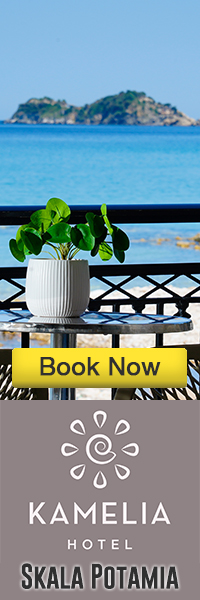Culture & Fun
Experience Age-Old Traditions

The rich nature of Thassos, the mild climate, and the agricultural occupations of many residents have inspired events that take place on the island every year. These cultural events are uniquely connected to local customs and traditions which Thassians have passed down over many generations.
Residents are actively involved in local culture clubs, striving to make the island's traditions known to its visitors, and to bring them closer to the spirit of Thassos. These clubs hold various events throughout the year, especially during the summer months.
By taking part in some of the local events and celebrations, you'll get close to the locals and witness what open-hearted and hospitable people they are. You'll also see that they really enjoy good fun!
Carnival

The fun and joyous Carnival season is felt all around Thassos with events and celebrations being held in all of the villages. It's the time of year for locals to come out of their winter hibernation, let their hair down and have a good time. It's also an excellent opportunity for visitors, both Greek and foreign, to come in contact with the history of the Carnival.
The roots of these joyous events lie in the ancient worship of the Greek god Dionysus who is the god of wine and drunken revelry, theatre, agriculture and fertility. It could be said that these modern Carnival events on Thassos are a continuation of the ancient Dionysus festivals, which are held to mark the end of the winter season and to symbolise nature's awakening from hibernation, also thought of as the rebirth of Earth.
Panagia

Carnival held in the mountain village of Panagia is a true spectacle, having its roots in Greek mythology and honoring the god Dionysus, or “Bacchus” (as he was otherwise known), which is the name that was given to the local culture club of Panagia which is responsible for organising the village's Carnival celebration each year.
Since 1880 the locals have been reviving the ancient Dionysian festivities through Carnival, with a lively parade of floats, amusing masks, decorative costumes, and plenty of dancing and singing in the streets. They also make a worthy effort to connect local tradition and art, by hanging up colourful home-made rugs, carpets, and other woven items for display on their balconies.
Carnival time in Panagia is a special way to spend Clean Monday with great food, great fun and plenty of spice! You can enjoy the rowdy and festive street theatre which consists of mostly naughty words, innocent flirting, humorous reproductions of current world events and the traditional Greek Carnival dance called “the rubbing of the pepper”.
This is a dance with lots of creativeness, where the first dancer holds a belt and orders the participants to rub the pepper on various parts of their body. “How is the pepper rubbed by the devil's monks?!” he exclaims. “It is rubbed and sifted with the knee!” answer the dancers, who immediately imitate the corresponding move. Naturally, the lead dancer then shouts new orders related to the rubbing of the pepper. These orders concern other, more personal, parts of the body... and beware whoever does not follow the leader's commands! The belt and its punishment prove to be rather heavy, yet very amusing for the watching crowds. Of course, wine is plentiful and the feast goes on until the morning.
The floats of the Carnival parade in Panagia are made of simple materials and the float leaders plainly recite humorous texts verse by verse, while the rest of the members repeat the verses in a certain rhythm creating a wild Dionysian atmosphere.
The main aim of the day is to have fun, and recent events in the news are usually the focus of attention. Political issues concerning MPs, public people, items of public interest, local problems, television shows and the like take centre stage. Also though, local people from the village and old customs that tend to get lost throughout the years are also remembered. Images from history and mythology all come to light in a public feast which will excite every visitor. The carnival participants of the culture club, Bacchus, are really into the joyful mood and are very imaginative!!!
Potamia

On the last Sunday of Carnival, Potamia fills with life and excitement as festivities erupt in the village center. Big and colourful floats are paraded through the streets at around midday, with lots of music, voices and laughter engulfing the village. Fun and dance, good wine, and a Dionysian spirit are the major elements of this joyous feast.
The village's culture club organises Carnival for Potamia and blends local traditions with plenty of humour. Much of what they do projects anything and everything of modern society in an amusing and sometimes critical attitude, usually resulting in more laughter than most can handle!
Skala Maries & Limenaria

In the same spirit of carelessness and joy, various carnival floats, sea food delicacies, wine and Tsipouro make their presence felt at the picturesque village of Skala Maries as well as in Limenaria.
These events take place on Clean Monday and hold a special treat for the participants and visitors as they can also spend a wonderful day by the sea.
Rachoni

On the last Sunday of the carnival in the mountainous village of Rachoni, there are various carnival events which consist of local traditional dances performed by the local dance club. Also a parade of carnival floats made by the villagers passes through the village and gathers in the local school grounds, while the people on top of each float recite humorous dialogues with the aim of describing the everyday world in a satirical way.
There is a lot of free wine on offer while the visitors have the chance to try all the local delicacies prepared by the women of the village.
Limenas

On Clean Monday there are different activities taking place that are fun and entertaining for both visitors and locals alike in the island's capital.
At the Old Harbour in Limenas, local fishermen gather to barbeque their fresh catches and freely offer it to visitors. You'll have the chance to try fresh fish and sea food on the day marking the start of Lent. You can try mussels, octopus, squid, sea-urchins and other delicacies caught locally from the Aegean Sea.
The kindness and hospitality displayed makes every visitor feel welcome and at home. Tsipouro and wine are abundant, while dancing and singing goes on during this delicious feast.
Summer Festival

Many events are held on Thassos during the summer tourist season. Thassians are proud of their culture, and they love to display their customs and way of life through dance, song, music from local folklore musicians, and their locally-made products. Every village and every native resident has something special to offer visitors of the island. Therefore visitors can immerse themselves in age-long traditions and even take an active role in many of the activities.
A guide of these events is distributed all over the island every summer so that visitors can be informed with a complete and detailed list of events.
Ancient Theatre

Τhe ancient theatre of Thassos is located at the top of a hill overlooking Limenas on the mountainside. The theatre sits as nature intended with sea views opposite the little island of Thassopoula and the mainland of Greece. It has stood there since the 5th century B.C. and the wonderful view it offers, justifies completely the choice of our ancestors to build their cultural centre in such a spot.
The modern Thassians, in continuation of their ancestors' tradition, have turned it into the centre for the cultural events of Thassos, including the Philippi festival which takes place every year during July and August. The shows which take place here are noted for their variety, accuracy and quality.
People come every summer to watch theatrical performances by national theatres from around Greece, as well as famous Greek singers. Local amateur theatrical groups and children’s theatres also come here to perform.
Kalogeriko

In the island's capital Limenas, the Kalogeriko (which translates to "house of monks") was built by monks from Mount Athos during the second half of the 19th century, around the year 1858. The building today is fully renovated and it hosts lots of cultural and artistic events like art galleries, historical lectures, conferences and musical concerts. It constitutes the heart of the cultural events which take place in Thassos all year round.
Inside the Kalogeriko there is an exceptional reproduction of a typical traditional old Thassian house, which is a great opportunity to look back into the past and imagine what the old Thassian way of life was like.
Kazavitiana

Going upwards though the village of Prinos towards the two traditional villages Mikro and Megalo Kazaviti, you will notice the small amphitheatre built at the lower part of the road on the left side imitating the ancient amphitheatres, set in the midst of greenery.
At the end of July to the beginning of August during the time of celebration for the convent of Saint Panteleimon a special festival takes place there called “Kazavitiana”. It consists of various cultural events that include theatrical shows, classical music concerts plus traditional folklore music and dance nights.
Astrocamping

At the top of the tallest mountain on Thassos called Ypsario, more than 300 campers “touch the stars” as they participate in an annual event known as "Astrocamping", organised by a club called Friends of Astronomy. The event's moto is “Touching the Stars”, which is very close to what participants get to do through nighttime space observations and astronomy seminars.
The lights of the camp go out at 11pm as amateur astronomers and space enthusiasts use telescopes to observe and photograph the starry night sky.
A mobile planetarium called StarLab is brought for this special annual event all the way from Thessaloniki. StarLab has visited hundreds of schools in Greece and Cyprus and has a large screen that shows the movements and positions of the stars and planets in our night sky.
This days-long event offers youngsters a unique opportunity to participate in creative activities that are fun, educational, and connected with astronomy. Activities include drawing, story-telling, and building things with their hands. They get to walk on natural mountain paths, learn about the environment, and become more aware of the importance of respecting our planet and Mother Nature.
Astrocamping is a wonderful place for everybody, young and old, to learn about the world of the stars!
Honey Festival

Every year in the beginning of August, a honey festival is organised by the Thassian Honey Association of Prinos. Visitors there can enjoy a free sample of all the honey products and every kind of Thassian product exhibited here, like traditional Thassian sweets, dairy products and wines.
During the festival, dance groups of the local culture clubs dance traditional Greek dances, there are barbequed goodies for the entire crowd and in general an atmosphere of delight and satisfaction is enjoyed, reflecting fully the hospitality of the group and all the residents of the area.
The Thassian Honey Association of Prinos began its work in 1973 by bringing together the honey-makers of the area and today it has 104 members. Its facilities are located near Skala Prinos, where one can buy chestnut honey, honey of the forest, pine tree honey, bee-wax, wax and royal jelly.
Thassian Wedding
The image of the traditional Thassian wedding presents a great cultural interest as it preserves the cultural heritage of the location. This special cultural event takes place every year at the mountainous village of Theologos, the ancient capital of the island. It is connected with events of the great celebration of August the 15th and many visitors from all over Greece and abroad come to be part of it. The preparation of the wedding lasts for a whole week and it starts on a Monday. The girls of the village wash and iron the bride's trousseau or wedding chest items while they sing songs. They then exhibit them at the traditional Manor Hatzigiorgi where the folklore museum of the area is also located. The gathered crowd comes to see them and throw rice and coins at them. It is a practice that makes the trousseau known to the whole village. The procedure is completed with the transportation of the trousseau to the house of the groom on the Friday before the wedding.
On the day of the wedding, at the house of the groom, preparation of the groom begins which includes ‘the shaving’. After this, the procession of these guests go to the house of the best man with whom they will all go together to pick up the bride from her house.
At the bride's house her friends are dressing her up while singing traditional Thassian wedding songs. The bride's mother takes her to the next room, gives her the last advice for her new life, puts a little lock around her waist and puts a net over her head to protect her from the evil eye and sorcery. At the same time a procession of the groom and the best man reaches the bride's house. This is when the groom needs to vow to do whatever is asked of him in order for the bride to be given to him. The vows are never enough and speeches follow with teasing phrases and songs until the bride surrenders herself with the girls singing “O groom please grant us a favour, the flower we give unto you do not let it wither”.
The wedding procession then crosses the whole village and reaches a place where the wedding kissing takes place. These are actual kisses, wishes and gifts to the newlyweds. Now is the time for the guests to pin paper money, gold coins and jewelry onto the groom's suit and the bride's wedding dress while the mother- in- law treats the happy couple to a walnut sweet with the same spoon as her seal of approval. This is a symbolism of their new life together and of her wishes for the proper foundation of the marriage.
Straight afterwards the wedding feast begins. The residents of the village will have already been tempting the guests with Tsipouro, wine and the traditional sweet Saragli. The feast continues until the morning in one of the local tavernas. During these days the people of the whole village of Theologos celebrates and are dressed in their best clothes. The housewives hang over their balconies every kind of homemade woven item in their effort to connect the wedding tradition with the modern era and thank everyone who passionately observes the Thassian wedding in Theologos every summer.
The Jumping Over the Fire
August has always traditionally been for the Thassians, a month of cleansing since it was connected with the 15th day of lent period for the celebration of the Virgin Mary. It also marked the beginning of a new era of preparation for the autumn-winter as the proverb says “from August winter and from March summer”.
As a result, the custom of the jumping over the fire is closely associated with the traditions of the island. Additionally the older housewives, from the evening of the 31st July, would tidy their houses and paint their backyards to welcome the new month. In the village, the children would gather anything that could be burned and create a small fire because the fire should be small enough so that people could jump over it without being burnt. They would then light three fires in the middle of the road at a reasonable distance from each other and they would jump over them shouting “Avgoustos Paravgoustos with figs and walnuts and red grapes!”. “You won't get fever in the winter!” they say.
Indeed other traditions from Greece also mention the purifying power of the fire in preserving the good health of the residents. Sometimes they used to bake garlic in this fire which they would later eat so as to shield their health. They would then gather the ash and scatter it on top of the fig trees so they may preserve their fruits longer.
The custom still carries on in most of the villages of Thassos today. If you find yourselves amongst the celebrations on the night of the 31st July, do not hesitate to jump over the August fires. You never know, perhaps the locals are right and you will welcome the new month filled with health and wellbeing for the rest of the year!!!
Music
Music Workshop

The Thassos Music Workshop is a unique cultural association which organises musical events around the island. The events are combined with a deep passion for Greek literature and poetry, making them all the more interesting.
With its headquarters in Limenaria and members from all over the island, the workshop searches for new information about Thassian traditions to write and sing about, as well as to record and preserve them for future generations.
The club collaborates with parents' and teachers' associations on the island, regularly visiting kindergartens, primary schools and high schools to perform, show, and teach students about ancient and traditional musical instruments.
Local events for other forms of art are often organised in partnership with the Thassos Music Workshop in order to compliment as well as highlight their artistic activities and skills. These events are organised purely for pleasure and members' offer their time free of charge due to their love for what they do.
They are a very special treat for anyone who sees them!





